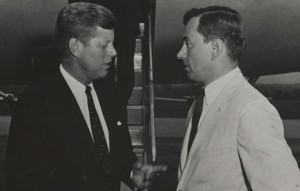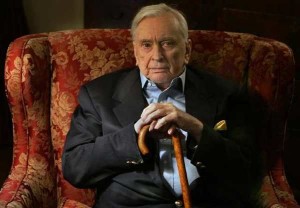I interrupt my commentaries on the London Olympics to share this one on the death of Gore Vidal. He was that important.
Indeed, to give you a sense of just how important, mere hours before the New York Times posted his obituary yesterday, I was bonding with a tech-support woman over our mutual fondness for Vidal. Specifically, when I said he is my favorite author in response to one of those secret questions we’re all familiar with, she shrieked:
Wow, he’s my favorite too! I’ve been doing this for 11 years and you’re the first person to name him.
I could not resist making light of the irony that, based on her unscientific sampling, it would appear our favorite author is not very popular….
Of course, I prefer to think this merely affirmed our discriminating literary palette. But there’s no denying that Vidal’s bombastic, acerbic, and defiantly polemical style is an acquired taste. What’s more, nobody seemed to take more relish in being inaccessible to the masses.
 Never mind that his affectation in this regard was belied by the way he shamelessly basked in the reflected glow of JFK’s Camelot. Not to mention the more obvious plea for public acceptance his failed campaign in 1960 for a House seat from New York and his failed campaign in 1982 for a Senate seat from California both represent. In point of fact, there seems little doubt that the signature disdain Vidal developed for American public opinion stemmed from the trauma these two instances of rejection inflicted:
Never mind that his affectation in this regard was belied by the way he shamelessly basked in the reflected glow of JFK’s Camelot. Not to mention the more obvious plea for public acceptance his failed campaign in 1960 for a House seat from New York and his failed campaign in 1982 for a Senate seat from California both represent. In point of fact, there seems little doubt that the signature disdain Vidal developed for American public opinion stemmed from the trauma these two instances of rejection inflicted:
There is not one human problem that could not be solved if people would simply do as I advise.
(Vidal, New York Times Obit, August 1, 2012)
Not that this ever made him the least bit reluctant to offer advice in his 25 novels, two memoirs, and countless essays. He was also a playwright and screenwriter, and even dabbled in acting – appearing, ironically, is such low-brow fare as The Simpsons and The Family Guy.
 Actually, a recurrent theme in Vidal’s writings is his unrequited love for America, which found its most-cathartic flourish in The Decline and Fall of the American Empire (1992). Notwithstanding this, he was a noted historian and terrific novelist, which made him nonpareil in the genre of historical novels – as his seven-novel series, Narratives of Empire (which begins with Burr), will attest.
Actually, a recurrent theme in Vidal’s writings is his unrequited love for America, which found its most-cathartic flourish in The Decline and Fall of the American Empire (1992). Notwithstanding this, he was a noted historian and terrific novelist, which made him nonpareil in the genre of historical novels – as his seven-novel series, Narratives of Empire (which begins with Burr), will attest.
Interestingly enough, I only happened upon the archliberal Vidal because of my fondness for the polemics of the man who would turn out to be his life-long literary and political nemesis, the archconservative William F. Buckley Jr. Their public debates and spats are legendary, but I always got the disquieting sense that Vidal’s retorts, no matter the occasion or subject, were always laced with envy and resentment over the relative acclaim Buckley enjoyed.
Regrettably, this sense was borne out when, instead of showing due respect, Vidal pissed on Buckley’s grave four years ago with this now infamous bon mot: “RIP WFB — in hell.”
 But, to be fair, I suppose there was no reason to expect any more from a man who took unbridled pride in describing himself as follows:
But, to be fair, I suppose there was no reason to expect any more from a man who took unbridled pride in describing himself as follows:
I’m exactly as I appear. There is no warm, lovable person inside. Beneath my cold exterior, once you break the ice, you find cold water.
(Vidal, New York Times Obit, August 1, 2012)
Well, that cold water should serve him well; because he’ll probably end up right where he thought WFB was headed.
Vidal died on Tuesday in Los Angeles from complications of pneumonia. He was 86.
Farewell, Gore.
NOTE: No doubt Vidal would be infused with a mixture of outrage and glee over the way American reporters are broadcasting that President Obama signed a “secret order” yesterday to provide “covert” support to the Syrian rebels. After all, the folly inherent in such broadcasts, coupled with the fact that these reporters seem utterly clueless about this folly, is just a symptom of the continuing decline and fall of America.
Related commentaries:
William F. Buckley dead